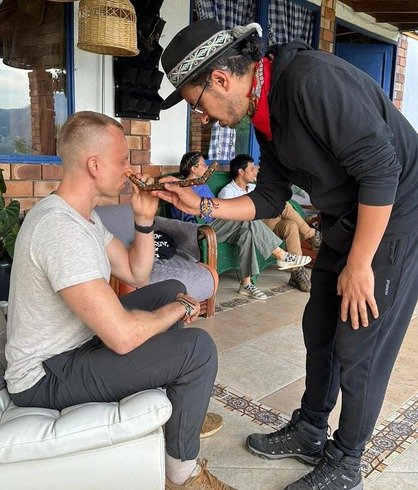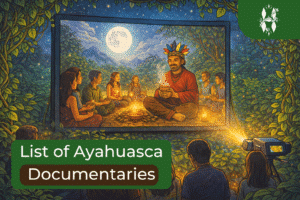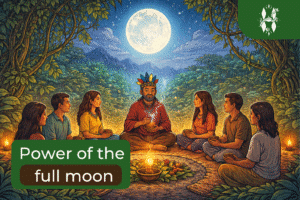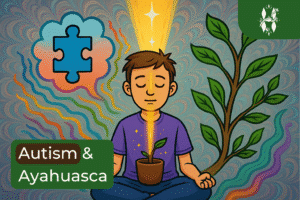Have you ever heard of rapéh? This traditional medicine, used by indigenous tribes in the Amazon, comes as a powder made from a blend of various trees and plants. Often mixed with tobacco for its cleansing and healing properties, rapéh, also known as hapey, rapeh, rapé, or hapé, holds a strong place in Amazonian culture. Join us as we explore what it is and uncover its many benefits.
Key takeaways
- Rapéh, also known as Hapey, is a traditional medicine used by indigenous tribes in the Amazon. It is a powder made from various trees and plants, applied through the nostrils using a special pipe.
- Like many of these plant medicines, it gets worse before it gets better. Immediate effects of the rapéh may be uncomfortable but in the longer term you can feel many benefits – mental, spiritual and physical.
- Rapéh is often used before an Ayahuasca ceremony as it can help participants calm their nerves and ground themselves. It also brings a level of clarity around their intention, setting a focused mindset.
Table of Contents
“Rapéh is incredibly beneficial for breaking free from thought loops, offering mental clarity and a sense of being grounded.”
How is Rapéh applied?
Rapéh is typically blown into the nostrils using a special pipe, facilitating deep cleansing and centering experiences. It can either be administered by another person or self-applied using an auto applicator. It is important to first take a moment to set an intention with the rapéh. Focus on what you want to achieve, whether it’s mental clarity, emotional healing, grounding, or connecting with your inner self. This can greatly enhance the effectiveness of the medicine.
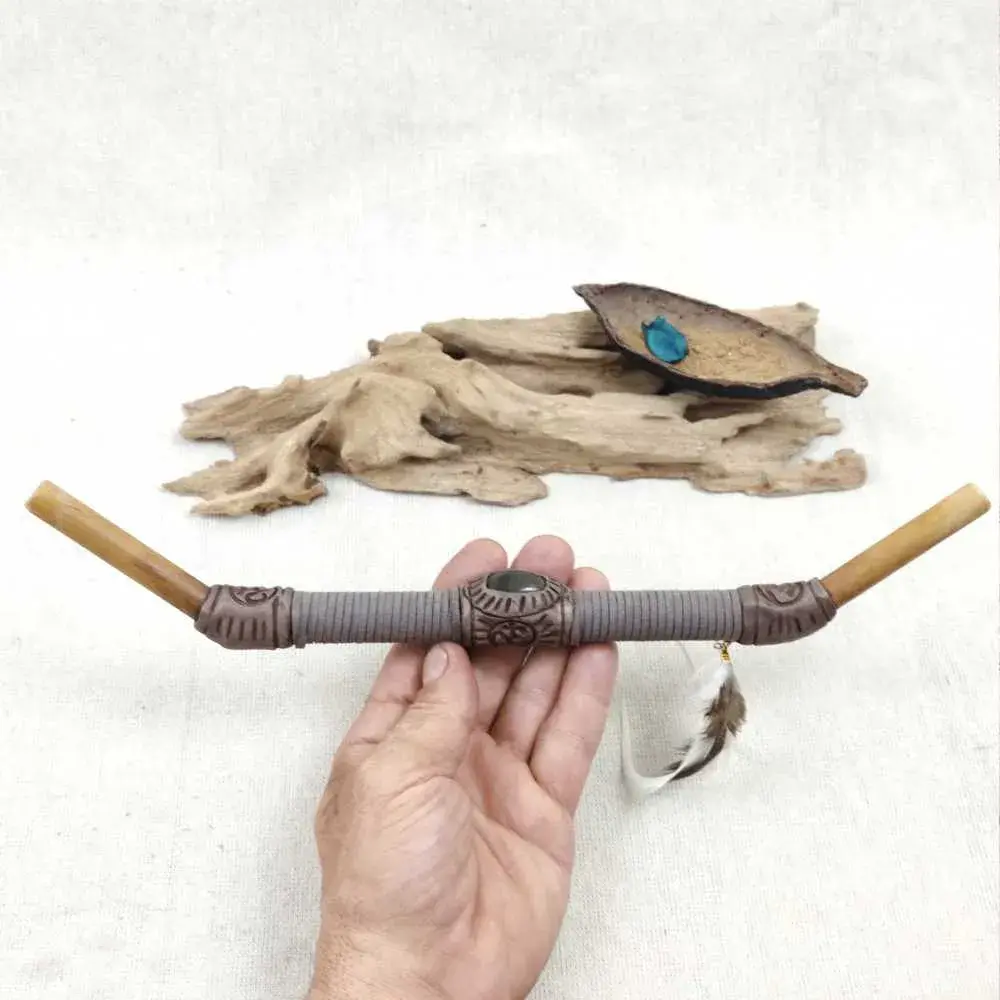
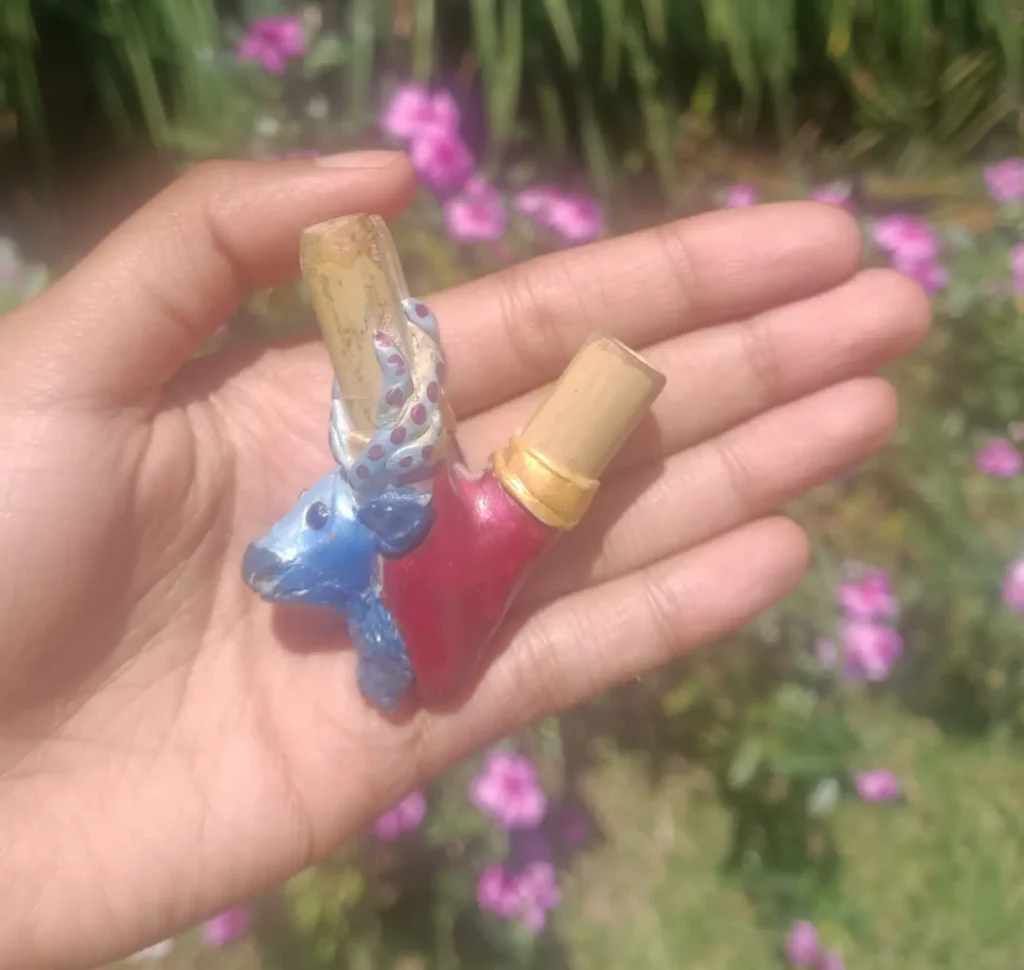
Before the Rapéh is applied, it’s important to hold your breath. Some traditions suggest exhaling first and then holding your breath, while others recommend inhaling and then holding your breath.
Once applied, you will feel an uncomfortable sensation in the nostril and forehead area. This sensation often travels from your forehead to your head, followed by a sensation throughout your body. The intensity of these sensations depends on the quantity of Rapéh used and the strength of the blow during application.
Rapéh can cause various physical reactions such as shivering, hot or cold sensations, sweating, and in some cases, nausea and vomiting. It can also create a sense of light-headedness or dizziness.
After the Rapéh is applied, it’s crucial to breathe only through your mouth and avoid breathing through your nose. After about five minutes, you can blow and clean your nose. There will likely be a significant amount of discharge, which is considered a way of expelling negative energies and impurities from your body and spirit.
Must read blog: What to expect in your Ayahuasca ceremony
Spiritual benefits of Rapéh
Breaking Free from Repetitive Thoughts
Have you ever felt trapped in endless loops of repetitive thinking? Rapéh is incredibly beneficial for breaking free from these thought loops, offering mental clarity and a sense of being grounded.
Enhancing Your Meditation
When you incorporate Rapéh into your meditation practice, you connect with the energy and spirit of that particular blend of plants. This connection can silence compulsive thoughts and help you tune in to your inner self, allowing messages of clarity and peace to come through.
These messages manifest in various ways. For example, you might experience physical sensations such as back pain. It’s not that the Rapéh is causing the pain, but rather that it’s helping you connect with your body and become aware of pain or issues that you might have been ignoring.
Overcoming Emotional and Spiritual Blockages
Rapéh is also effective in breaking through emotional and spiritual blockages. Sometimes, there are things we struggle to push through or let go of on our own. The plant medicine in Rapéh can assist in this process, helping us release and move past these obstacles.
Processing the Past
Rapéh can bring up memories from the past, prompting emotional release and processing. This can be a powerful tool for healing, as it helps you confront and integrate past experiences, leading to emotional balance and well-being.
Physical conditions that Rapéh can alleviate
Relieving Headaches
Rapéh can work wonders for headaches. While it might initially intensify the pain, this is part of its healing process. By pushing through the discomfort, rapéh ultimately brings relief and clarity.
Clearing Nasal Congestion
If you struggle with nasal congestion, runny nose, and sneezing, Rapéh’s cleansing properties can help with this. It clears the nasal passages, alleviating symptoms and making breathing much easier.
Boosting Energy
Rapéh provides an energy lift by removing stagnant energy and making you feel more awake and alert. Its effects can boost both the mind and body, helping you feel more energized and focused.
“Specific types of Rapéh, like Parika, can be particularly helpful if someone is struggling to connect with Ayahuasca.”
How Does Rapéh Relate to Ayahuasca?
Rapéh is a related medicine to Ayahuasca, often used in conjunction with Ayahuasca ceremonies. While not every Ayahuasca shaman incorporates Rapéh into their practice, it is commonly seen in many ceremonies.
Rapéh before a ceremony
Rapéh is frequently used before the ceremony to help participants calm their nerves and ground themselves. This grounding effect helps prepare individuals energetically for the Ayahuasca experience. Applying Rapéh before the ceremony can also bring a level of clarity around the participant’s intention, setting a focused mindset for the journey ahead.
Must read blog: Ayahuasca Intention
In some instances, participants may vomit after using Rapéh, which is considered beneficial. This purging process indicates that Rapéh is already beginning to cleanse the body and energetically prepare the individual before they even consume Ayahuasca.
Rapéh during a ceremony
During the ceremony, Rapéh can be used to address specific needs. It can help break through blockages, assisting participants who may feel stuck or unable to connect deeply with the Ayahuasca. Specific types of Rapéh, like Parika, are known for their heart-opening properties, which can be particularly helpful if someone is struggling to connect with the medicine.
Additionally, Rapéh can aid in the vomiting process during the ceremony. If a participant has not vomited for several hours and is experiencing intense effects from Ayahuasca, Rapéh can facilitate the purge, helping to relieve discomfort and balance the experience. However, the use of Rapéh in such situations depends on the participant’s process, the timing within the ceremony, and the approach of the medicine giver.
Must read blog: Why you vomit on Ayahuasca
Where Does Rapéh Come From?
Rapéh comes from the Amazon; there are many different types, with the highest variety coming from Brazil. The Amazonian tribes have perfected the art of creating different blends, each with unique properties and effects.
Can You Use Rapéh in Your Day-to-Day Life?
Yes, Rapéh can be incorporated into your daily routine. It can enhance your meditation practice and help you ground yourself in various situations. Whether before an important meeting, after an emotionally charged conversation, upon receiving bad news, or when you want to connect more deeply with nature, Rapéh serves as a powerful tool to strengthen your connection with yourself.
However, it’s important to be mindful of where and how you use Rapéh. Applying it in public or around people unfamiliar with it might lead to misunderstandings or concerns. The act of blowing powder into your nose can appear strange or alarming to those who don’t know about Rapéh, potentially being mistaken for drug use – which of course it is not. While it’s important not to limit yourself because of others’ projections, being considerate of your surroundings and the people around you is also important. This awareness can help you navigate these spaces more comfortably while respecting your personal practices.
What kind of rapéh exist
Here’s a list of different types of Rapéh and their traditional uses:
Tsunu (Tsunú)
Tsunu is one of the most popular types of Rapéh, known for its grounding and balancing effects. It is often used to help calm the mind, ease stress, and provide mental clarity. Tsunu is also beneficial for those seeking emotional stability and spiritual connection.
Parika
Parika is recognized for its heart-opening properties. It is used to enhance feelings of love, compassion, and emotional release. Parika is often applied during deep spiritual ceremonies to help individuals connect with their emotions and open their hearts to healing.
Nukini
Nukini Rapéh is known for its gentle yet powerful healing properties. It is often used for clearing the mind, enhancing focus, and providing a sense of peace and tranquility. Nukini is suitable for meditation and for those seeking inner harmony.
Kuntanawa
Kuntanawa is a strong and invigorating Rapéh, often used for energizing the body and mind. It helps to clear mental fog, increase alertness, and remove blockages that may hinder spiritual growth. This Rapéh is ideal for ceremonies where heightened awareness and strength are needed.
Cacau
Cacau Rapéh is made from cacao and is known for its heart-warming and nurturing effects. It is used to promote joy, emotional healing, and a deep sense of connection with oneself and others. Cacau is often applied during ceremonies that focus on self-love and community bonding.
Can You Get Addicted to Rapéh?
Addiction is a big term, and it’s essential to differentiate between physical addiction, psychological addiction, and dependency – which is different to an addiction.
Rapéh can offer many benefits, and some people might find themselves developing an automatic response to use Rapéh whenever they face a challenging situation. While it is a powerful tool, relying on it as your only tool may not be ideal. It’s beneficial to have a diverse tools to be able to deal with the emotional turmoil of day-to-day life.
Using Rapéh is often seen as a better alternative than more harmful coping mechanisms like smoking cigarettes. However, it’s important to approach Rapéh use with self-awareness and moderation. Plant medicines, including Rapéh, tend to self-regulate; if used excessively, their effects might diminish or even reverse, leading to no benefits or adverse effects.
Honesty with oneself is crucial. If you notice that you’re overusing Rapéh, it might be a signal to slow down or take a break. This doesn’t mean you have to stop forever, but pausing your use can help reset your relationship with the medicine. When you reengage with it later, you might find a renewed and more balanced connection.
How Often Should You Do Rapéh?
Do Rapéh as often as you feel you “need” it. However, it’s generally advisable not to use it more than 1-2 times a week. Overuse can potentially lead to a level of dependency, which is best avoided. Keeping your usage moderate ensures that you can maintain a healthy relationship with Rapéh, benefiting from its effects without becoming overly reliant on it.
Listening to your body and intuition will guide you in determining the appropriate frequency for your Rapéh use, ensuring it remains a helpful tool in your personal and spiritual practice without becoming a crutch.
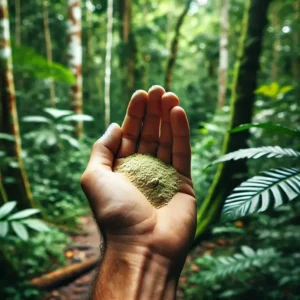
“Personally, I do not receive rapéh from just anyone.”
Can Anybody Apply Rapéh to Others?
Technically, yes, anyone can apply Rapéh to others, but it is not recommended. There is much more to the practice than simply putting some powder in a pipe and blowing it into someone’s nostril.
The application of Rapéh involves understanding the appropriate type of Rapéh for the occasion, the different styles of blows (soft, strong, starting soft and finishing strong, short strong, long strong, etc.), and the energy of the person applying it. The person applying Rapéh needs to have a deep connection with the medicine and a clear understanding of the spiritual and energetic aspects involved.
Personally, I do not receive Rapéh from just anyone. I have heard stories of people feeling very bad after receiving Rapéh from someone inexperienced, even many people in that group having the same experience. This might have been due to each person’s individual process, but it highlights that there are many factors to consider for proper application.
Some practitioners incorporate specific prayers or rituals that come to them through their own experiences with Rapéh, adding another layer of complexity.
At festivals there are often people applying Rapéh to others. This can sometimes feel like an attempt to play a role or seek attention, reflecting a form of pseudo-spirituality. Sharing something without fully comprehending, understanding, or studying it can be problematic.
While it might offer a positive initial connection with the plant medicine for some, my belief is that such practices should be approached with greater depth and respect. However, it’s important to acknowledge that each person’s path is unique, and who am I to judge what might be best for others?
Must read Blog: Ayahuasca & cultural appropriation
Conclusion
Rapéh (Hapey) is a powerful plant medicine deeply rooted in Amazonian culture, and has many spiritual and physical benefits. It helps break negative thought patterns, enhances meditation practices, and provides grounding and clarity. Whether used together with Ayahuasca or as part of your daily routine, Rapéh can offer profound healing.
However, it’s important to approach Rapéh with respect and mindfulness. The application process is intricate, and it’s best to receive it from experienced practitioners who understand its subtleties. Moderation is key, as overuse can lead to dependency, ensuring a healthy relationship with this sacred medicine.
As you explore the benefits of Rapéh, listen to your body and intuition, and be mindful of your surroundings. Embrace Rapéh as a tool for personal growth and spiritual connection, while also honoring its cultural significance and the wisdom of the indigenous traditions that have preserved it for centuries.
FAQs
What is Rapéh?
Rapéh, also known as Hapey, is a traditional medicine used by indigenous tribes in the Amazon. It is a powder made from various trees and plants, often blended with tobacco for its cleansing and healing properties. It is blown into the nostrils using a special pipe, this is either administered to you or self-applied using an auto applicator.
What are the physical and spiritual benefits of using Rapéh?
Physically, Rapéh can provide headache relief, treat rhinitis by clearing nasal passages, and boost energy by removing stagnant energy. Spiritually, Rapéh helps break negative thought patterns, enhances meditation practices, and break through emotional blockages. It can lead to overall well-being.
Can You Do Rapéh in Your Day-to-Day Life?
Yes, Rapéh can be incorporated into your daily routine for enhancing meditation, grounding yourself, and improving mental clarity. However, use it mindfully and be considerate of your surroundings to avoid misunderstandings.

